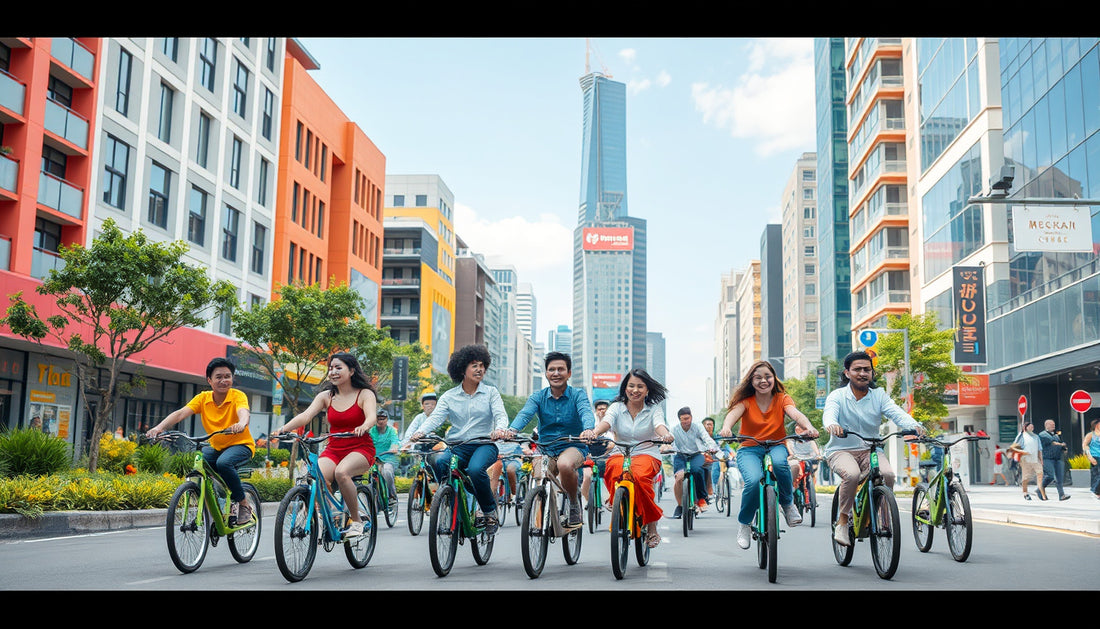
Revving Up the Revolution: Embracing the Electric Bike Moment in Urban Mobility
Share

In the rapidly evolving landscape of urban transportation, electric bikes (e-bikes) are not just a trend; they represent a pivotal moment in the future of mobility. As cities grapple with issues like congestion, pollution, and the need for sustainable transit solutions, e-bikes offer a viable, efficient alternative that benefits both riders and communities. But what does this revolution mean for urban dwellers? And how can we harness the full potential of the e-bike phenomenon?
The Growing Appeal of E-Bikes
E-bikes are designed to make cycling more accessible and enjoyable, particularly in urban environments. Here are a few compelling statistics that underline their significance:
- Increased Adoption: In 2022, e-bike sales surged to over 790,000 units in the United States alone, marking a 145% increase from 2020 (according to the Light Electric Vehicle Association).
- Commute Patterns: A 2021 study found that e-bike users are 2.5 times more likely to commute to work by bike than traditional cyclists.
- Environmental Impact: Studies suggest that if just 15% of car trips in cities were replaced by e-bikes, carbon emissions could be reduced by 18 million tons annually in the U.S. (source: Urban Mobility Report).
As urban planners and municipalities adopt policies to accommodate and promote cycling, e-bikes are becoming an integral part of the urban mobility solution.
E-Bikes: Solutions to Urban Issues
The benefits of integrating e-bikes into urban mobility strategies address some critical challenges faced by modern cities:
- Traffic Congestion: With over 29% of Americans commuting by car daily, e-bikes can significantly reduce the number of vehicles on the road.
- Pollution Reduction: E-bikes produce zero tailpipe emissions, helping cities lower their air pollution rates and improve public health.
- Affordable Mobility: E-bikes typically cost less than owning and maintaining a car, making them a budget-friendly option for many residents.
Notably, Rebecca Peters, a transport planner and sustainability advocate, states, 'E-bikes are not just an alternative; they are a necessity for urban environments aiming for greener futures. When people choose e-bikes, they choose to contribute to cleaner air and less congested streets.'
Overcoming Barriers to E-Bike Adoption
Despite their advantages, certain barriers remain that may hinder the widespread adoption of e-bikes. Here are a few to consider:
- Infrastructure Gaps: Lack of adequate biking paths or e-bike docking stations can impede potential users.
- Cost of E-Bikes: While prices are declining, the upfront cost can still be a barrier for some individuals.
- Fear of Safety: Concerns about bicyclist safety in city traffic can prevent potential riders from making the leap to e-biking.
Addressing Safety and Infrastructure
To fully realize the electric bike moment, cities must take decisive action on infrastructure and safety measures:
- Develop dedicated bike lanes that separate cyclists from vehicle traffic, reducing the risk of accidents.
- Implement comprehensive public awareness campaigns to educate both e-bike users and motorists on shared road use.
- Offer financial incentives or subsidies to lower the upfront costs for e-bike purchases.
Dr. Angela Glover Blackwell, founder of PolicyLink, emphasizes, 'Creating an ecosystem that supports e-bikes will transform not just transportation, but also our communities.'
The Future of Urban Mobility
As the conversation about urban mobility evolves, e-bikes are positioned to play a transformative role. While challenges persist, they also present an unprecedented opportunity to rethink how we move through our cities.
Imagine a world where every urban resident, regardless of age or fitness level, feels empowered to hop on an e-bike for a short trip—reducing reliance on cars, decreasing traffic, and fostering a sense of community.
Call to Action
Are you ready to join the e-bike revolution? Whether you are a city planner, potential rider, or a member of your local community, your involvement is crucial. Advocate for better bike infrastructure, reduce reliance on cars, and be part of the change that fosters cleaner, healthier cities. Let’s ride together towards a sustainable future!
Get on your e-bike today, and let's reimagine urban mobility!






